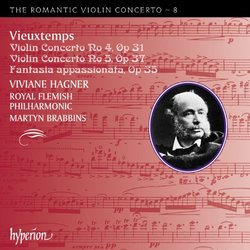Vieuxtemps Fantasia appassionata and concertos revisited
Gianluca La Villa | FERRARA, FE Italy | 05/20/2010
(3 out of 5 stars)
"Henri Vieuxtemps violin music deserved being rediscovered, and it has been in recent years, mainly by the effortless and devoted recorded performances by Misha Keylin, with Naxos.
This new CD by the German born violinist Viviane Hagner has the merit of insisting. Just as a first comparative approach limited to the Fantasia appassionata, I have in my ears at least two major performances,which totally overshadow this last for a number of reasons.The Paul Rosenthal recording of last decade of last century, coupling Concerto n.1,is in my opinion the reference performance from the point of view of rythm and life; Misha Keylin recent Naxos CD with all other major pieces by Vieuxtemps, such as Ballade and Greetings to America,brings about a wonderful sound and a personal and suave phrasing, never omitting the proper shades in every string, and is almost totally convincing. This Hagner performance of the Fantasia is more keen on showing acute sounds, preferably fastly put together, and is marred by a strange attitude in accelerating in the scales, of expanding melodramatically the slow beats, and at last veiling a little bit the rythmic verve of the final movement: it is a Tarantella, my God!,make it sound the like! Oh how I would have liked to hear e.g. Salvatore Accardo at the Teatro San Carlo in Naples if ever playing this piece, with all his technique and Neapolitan flair!
It is also strange that the orchestra accompanyment by conductor Brabbins explodes at the end with a fortissimo totally effacing the last notes of the violin and the melodic line of the orchestra.
And now some notations about the more known and performed Concerto n.4 in d minor, coupled with the even more performed Concerto n.5 in a minor ("Grétry" dedicated). Odd enough Concerto n.4, which is properly placed before Concerto n.5 on the cover, is on the contrary postponed into the CD listing.Never'mind. Limiting our exam to Concerto n.4, the Royal Flemish Philharmonic reading, Martin Brabbins again conducting, has the frequent defect of almost all performances of this concerto by contemporary orchestras: woodwinds, horns, brass and percussions too loud and strings not sufficiently nervous and dramatic. If you have the possibility to compare these performances with, say, the Kolner Symphony Orchestra conducted by Marszalek in the late '40ies, Vasa Prihoda being the live performing soloist (Podium CD), you will immediately feel how the Concerto sounded there completely different and much more interesting.
Instead, the final orchestra notes of the last movement, in Brabbins conducted recording, are unduly accelerated and totally remitted to drums and horns, while the solo and the strings ...disappear, cancelled.
As for Miss Hagner's interpretation it is more than sufficient, apart form a tendency to slur gruppetti (e.g. in the Adagio religioso), apart from indulging too much in the melodious notes, while running over the virtuoso passages,as if to overcome them as quickly as possible, and some ruvid chords all over (here again Prihoda's lesson, with his legato playing of chords with bow up and down, would bring much better result).It is worth noting, though, that in the 3rd movement ("Scherzo") the accent is wrongly applied by Hagner, since it seems that it is falling on the third note of a triplet, which is not correct: this is a tricky piece for the tempo, and Ysaye had already advised about this accentuation (I remember Franco Gulli told me about this point in Florence some years ago, after his splendid performance of Busoni concerto). All considered, we still prefer by and large Misha Keylin's (Naxos CD) more open and lyrical playing, still a reference recording among the restatements of this beautiful concerto in recent times."


 Track Listings (8) - Disc #1
Track Listings (8) - Disc #1